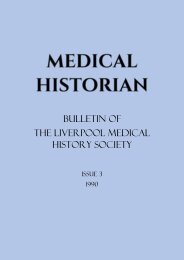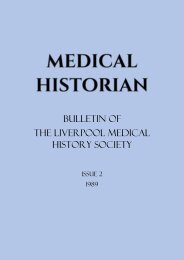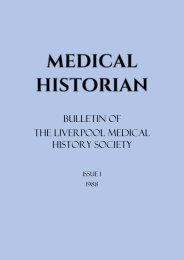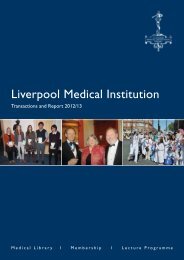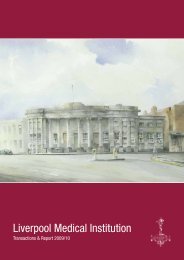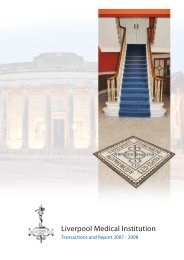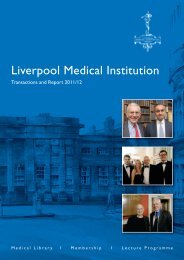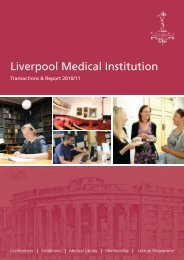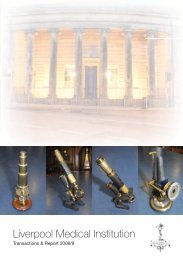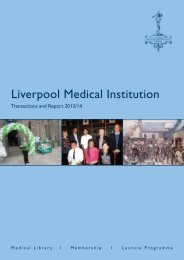LMITransactions&Report2014-15
Create successful ePaper yourself
Turn your PDF publications into a flip-book with our unique Google optimized e-Paper software.
LMI Transactions and Report 2014 - 20<strong>15</strong><br />
that there was no risk to the public, no action to take<br />
and no reason to proceed. However, it took just under<br />
two years before the letter saying this arrived on desk<br />
of the surgeon. During that time his revalidation date<br />
was due and because the GMC file was still open, the<br />
Revalidation Responsible Officer at the Trust could not<br />
action his revalidation process.<br />
Case Study Two<br />
A consultant surgeon in his mid sixties, nationally and<br />
internationally well known, received a GMC letter.<br />
The complainant was the private hospital at which he<br />
worked and where he had complained that the<br />
facilities fell short of the required standards. The<br />
complaint indicated 10 cases where his practice had<br />
been found wanting and threatened the safe care of<br />
patients.<br />
Within 9 to 10 months of receiving this letter all of the<br />
criticisms raised had been dismissed. However, 18<br />
months later he got another letter from the GMC<br />
saying it was now going to a fitness to practise<br />
hearing. The ultimate outcome of this hearing was<br />
that there was no case to answer. The effect on this<br />
man's life has been considerable both personally and<br />
professionally as a practising surgeon as well as to his<br />
family.<br />
Our speaker went on to say that the Medical<br />
Protection Society have said that 93% of doctors who<br />
go through fitness to practise processes report severe<br />
anxiety and stress. Whistle-blowing brings with it<br />
considerable personal risks.<br />
Revalidation<br />
Professor Narula changed to the subject of Medical<br />
Revalidation. He said that in the early 2000s the GMC<br />
was all set to institute new and improved<br />
recertification processes and procedures for doctors in<br />
medical practice in the United Kingdom. However,<br />
Dame Janet Smith, the High Court judge who chaired<br />
the Shipman enquiry, heavily criticised the ideas<br />
behind these proposals in her third and final report.<br />
Many lawyers criticised her for going outside of her<br />
remit in the enquiry by making these comments but<br />
her intervention led to a revisiting by the GMC of this<br />
whole process.<br />
Thus a whole new bureaucracy was designed to<br />
respond to the criticism but in fact the only real<br />
difference that came forth was the introduction of<br />
processes of feedback from patients and doctors. The<br />
main thrust of this process was to prevent another<br />
Shipman. But, our speaker went on to say, we all<br />
know Shipman's patients loved him so, even as a mass<br />
murderer, he was unlikely to be picked up by this new<br />
process. There was majority agreement for this from<br />
the audience.<br />
We are now in year two of the era of Revalidation. A<br />
phased process has been introduced and it is<br />
anticipated that all doctors in practice will have been<br />
revalidated by March 2016. There is still much<br />
sceptism abroad in the profession about the process<br />
and some believe that if approximately five per cent<br />
of doctors refused to engage, the whole system would<br />
collapse.<br />
Our speaker went on to say that the underpinning to<br />
Revalidation is annual appraisal. The annual appraisal<br />
process is meant to review the evidence of your<br />
practice as a doctor and the evidence to support the<br />
quality of that practice both in private practice and<br />
NHS practice. It is meant to be both formative and<br />
summative in supporting the continuing professional<br />
development of you, the doctor. “In my experience”,<br />
said our speaker, “I have been appraised since 2003<br />
but never been asked about my private practice.”<br />
The process of appraisal is that the doctor submits a<br />
portfolio of evidence in line with the four domains of<br />
the GMC standards for Knowledge Skills and<br />
Performance; Safety and Quality; Communications,<br />
Partnership and Team work and Maintaining Trust.<br />
Nowadays this is an electronic repository, which can<br />
be supplemented at the time of appraisal by paper<br />
records and evidence. Following a successful appraisal<br />
meeting, a summary is agreed by appraiser and<br />
appraisee and a professional development plan (PDP)<br />
is drawn up and this will form the framework for the<br />
next appraisal. Our speaker went on to say that there<br />
is a requirement in the portfolio for Reflection. He<br />
admitted that he was not sure what this was really<br />
about and that many felt the same way.<br />
One of the key things for appraisal, he offered, is the<br />
inclusion of national registry data about outcomes for<br />
index surgical operations. This is particularly true for<br />
surgeons. He said with considerable feeling that he<br />
had resisted the recent desire by government for<br />
publication of such data before individual clinicians<br />
had had time to see their own results. He went on:<br />
“There are in my opinion a whole lot of potential and<br />
18



